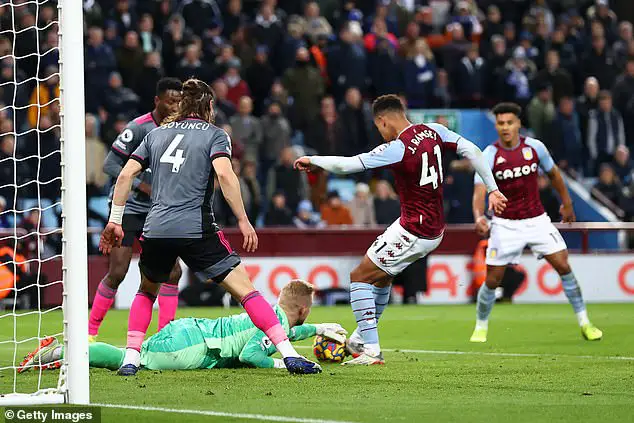One of the key talking points over the weekend was Aston Villa’s disallowed goal against Leicester.
After Matty Cash had caused havoc in the Leicester penalty area, Kasper Schmeichel and Jacob Ramsey raced to the ball which was loose in the six-yard box.
They seemed to reach it at the same time. The Leicester keeper got a hand on the ball, but the right foot of Villa’s attaching midfielder was stronger, and the ball hit the back of the net.
Those of us watching at home couldn’t be sure whether the goal should stand, thankfully Sky’s team cleared up the confusion.
After analysing the replay in slow motion, it seemed that Schmeichel had placed his hand on top of the ball a twelfth of a second before Ramsey made contact.
The rules state that the goalkeeper has the ball in his possession if he is holding it with both hands – or if he has one hand on the ball, which is also touching another surface such as the ground or his body.
That was the case in this situation, therefore, according to the rules the goal should not stand.
Paul Merson and Graeme Souness didn’t like the rule but agreed that if that is the rule then the goal should not stand.
So now we know, the referee got the decision correct – at least according to Sky Sport’s analysis.
However, later that evening on Match of the Day 2, the panellists had a different interpretation – and a pretty convincing one.
The MOTD team also read the rule and provided an extra insight that Sky had inexplicably missed.
In addition to the rule read out by Sky was an another add on that would entirely change the decision in a certain situation; it stated ‘except if the ball rebounds from the goalkeeper or the goalkeeper has made a save’.
Well, the ball did rebound off the goalkeeper’s right hand – that is why Schmeichel was scrambling to reach the loose ball in the first place.
To make Sky’s omission all the more baffling it should be pointed out that the caveat to the main rule wasn’t buried several paragraphs later – it was in the same longwinded sentence as the original rule.
Micah Richards and Leon Osman even turned their analytical minds to the lack of quality of the grammar on display in the official rule book. No commas, no semi colons no full stops.
So then, should the goal have stood? The MOTD panellists agreed that it should.
It is a badly written rule so perhaps that is why Sky didn’t bother with the second part of it – but it does seem like both they and the match officials ignored the key part of the puzzle.
To confuse matters further, the match report on the BBC website states that the referee was, in fact, correct to disallow the goal. BBC Sport’s report
So the BBC journalists don’t even agree with their own expert analysts.
Take a look below.

Lifelong fan of the Premier League, looking on from the outside since 1999 waiting for Forest to return to the top table where they belong. Probably get promoted this season.











